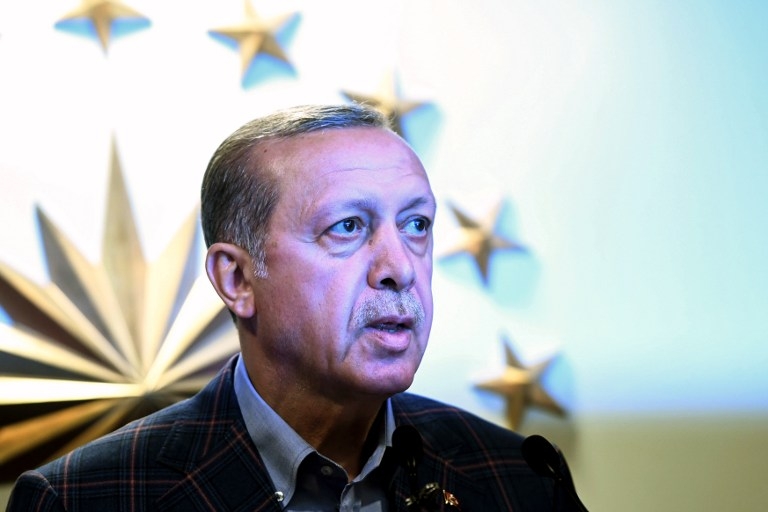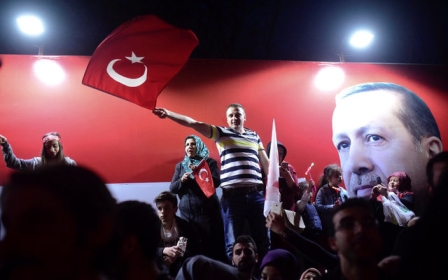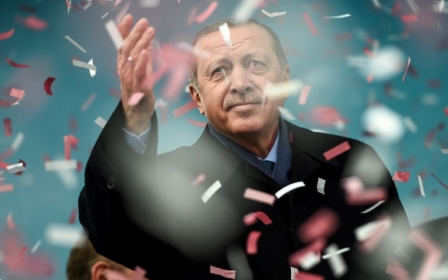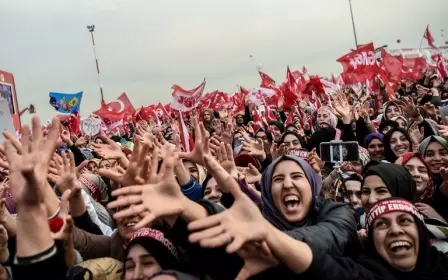Turkey referendum: Erdogan's narrow victory

After weeks of uncertainty, those Turkish public opinion polls predicting a very slight victory for the ruling AKP (Justice and Development Party) in Turkey’s fateful referendum on Sunday turned out to be correct.
Just under 48 million voters took part in the referendum in which there were about 1.3 million more "Yes" voters than "No" voters, giving President Erdogan a 51 percent majority. This was a couple of percentage points above the party’s showing in the November 2015 general elections. But this result produced little exultation. The AKP had allied in the referendum with the rightwing MHP (Nationalist Action Party) and so ought to have picked up a substantially higher percentage.
Its narrow victory came after a campaign fiercely criticised by some quarters outside Turkey as "the end of democracy" largely because of restrictions of access to the airwaves, media, and advertising on the "No" campaigners and widespread complaints of an atmosphere of pressure, including the nine-month-old state of emergency, making opposition voters fearful.
Bitter mood, sombre speech
In the hours after the campaign and the astonishingly rapid count (which is typical of Turkish elections), there was a bitter and angry mood among the losers and some protests. A spate of alleged irregularities at the polling booths, and the tangled question of allegedly up to 1.5 million "unregistered unstamped ballot papers", allowed by the election authorities even though this is not usually regarded as legal, sparked fierce criticism. The opposition wants a recount of up to 40 percent of the 48 million votes cast and there were angry protests in some cities.
But Erdogan has got his mandate to redesign Turkey’s governmental system assuming powers over legislation and the budget not usually enjoyed by leaders of Western democracies. Inside Turkey, cultural conservatives like the daily Yeni Akit hailed the referendum result as the death of the old secularist Turkey and published a mock funeral announcement for it.
The president, nevertheless, looked a little somber on television as he made his victory speech, indicating that the new constitution will not be introduced until 2019 when his present term of office expires. He said he would view the early reintroduction of the death penalty favourably, a pledge he repeated regularly in speeches during the campaign but one which would trigger a breach with the European Union and end Turkey’s EU candidacy.
Though the implementation of the new constitution may wait two years (it is not altogether certain that it actually will as many aspects of it already exist in practice), the president will now certainly move much closer to the AKP and perhaps even resume the party leadership which he gave up when he was elected president in 2014.
'No' in five largest cities and the southeast
In the meantime, the AKP must reflect on how to respond to the two pieces of really bad news for it in the referendum results.
First, the "No" campaign won in 10 key provinces in southeastern Turkey, demonstrating that many ethnic Kurdish voters there reject the new constitution. The AKP has put a determined face on this, pointing out that there was a strong swing to it in several of these provinces, though it has to be remembered that the poll was not just held under state of emergency conditions, but also that in most, if not all, of these provinces, elected officials have been replaced by ministry of the interior appointees from the civil service.
The glaring political problem in Turkey’s southeast has been exposed once again even though the region has been largely pacified in military terms.
The second big upset in the referendum was that Turkey’s five largest cities all voted "No", including Istanbul and Ankara, albeit these last two did so only narrowly.
The sea of flag-waving, cheering crowds who listened to Erdogan as he campaigned for a "Yes" vote suggested that he would win an easy victory. Istanbul and Ankara have been under the control of the AKP or its predecessor the Welfare Party, since 1994. Without them, it risks shrinking into a party of conservative provinces in Turkey’s interior with only a few cities, notably the large cities of central Anatolia, as its strongholds.
However, the AKP does not currently face any serious challengers from Turkey’s weak and poorly led opposition parties. The rightists are divided. The leaders of the pro-Kurdish HDP (Peoples' Democratic Party) are in prison on terrorism charges.
The AKP’s main opponent, the centre-left Republican People's Party (CHP), has lost election after election in a row without ever changing its leader in the way that a western political party would. And, unlike western political parties, it lives off generous budget subsidies rather than an active nationwide grassroots organisation. Its chronic unreality was demonstrated on Sunday evening by celebrations in the CHP’s Ankara headquarters at the narrowness of the margin by which it had been defeated.
In the closing days of the election, Erdogan warned that the CHP would be relegated to a museum of extinct political species after the referendum. He has even hinted ominously that he believes the CHP leader Kemal Kilicdaroglu might have negotiated with the coup-makers last summer.
Sharp EU turn
However, the most important item on the government’s agenda in the next few weeks will probably be the EU, especially if legislation on the death penalty goes ahead. The challenge has already been taken up by Brussels. Within a few hours of the announcement of the result, Jean-Claude Juncker, the EU Commission president, issued a terse joint statement with Federica Mogherini, the EU external affairs high commissioner, and enlargement commissioner Johannes Hahn.
Instead of the congratulations which Ankara may have regarded as its due, Juncker promises an Organisation for Security and Co-operation in Europe (OSCE) investigation of alleged electoral irregularities and calling on Turkey to respond to concerns of the Council of Europe over the continuing state of emergency.
This is the first time that the EU has flung down the gauntlet to Turkey in this way rather than avoid a confrontation by staying silent. The sharp change in tone is clearly linked to the accusations of Nazism made against the Netherlands and Germany by President Erdogan last month.
The president will almost certainly respond angrily to these criticisms, using the confrontation to fire up his support inside Turkey. A further battle of words with the EU is probable and, despite its heavy economic and political cost, an outright rift may follow.
- David Barchard has worked in Turkey as a journalist, consultant, and university teacher. He writes regularly on Turkish society, politics, and history, and is currently finishing a book on the Ottoman Empire in the 19th century.
The views expressed in this article belong to the author and do not necessarily reflect the editorial policy of Middle East Eye.
Photo: Turkish president Recep Tayyip Erdogan delivers a speech at the conservative Justice and Development Party (AKP) headquarters in Istanbul, on 16 April 2017, after the results of a nationwide referendum were announced (AFP)
New MEE newsletter: Jerusalem Dispatch
Sign up to get the latest insights and analysis on Israel-Palestine, alongside Turkey Unpacked and other MEE newsletters
Middle East Eye delivers independent and unrivalled coverage and analysis of the Middle East, North Africa and beyond. To learn more about republishing this content and the associated fees, please fill out this form. More about MEE can be found here.





